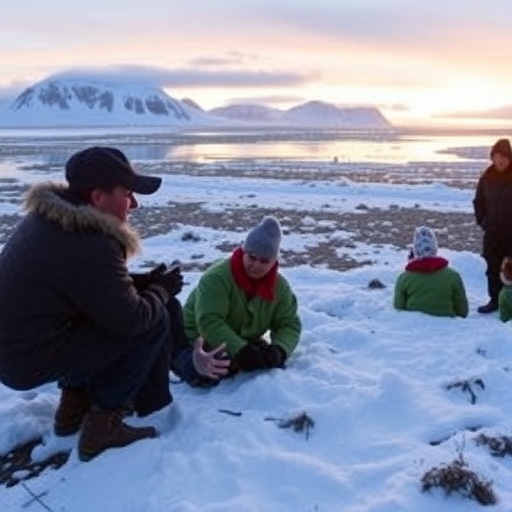The National Institute of Polar Research (NIPR), based in Japan, has released the latest issue of its prestigious quarterly journal, Polar Science (Vol. 44, June 2025), spotlighting one of the most pressing topics in contemporary environmental and social research: sustainable development in the Arctic for Indigenous peoples. This special feature delves into the multifaceted challenges and ongoing efforts essential to safeguarding both the cultural heritage and ecological integrity of the Arctic region—a territory spanning several countries and home to approximately four million residents, including Indigenous communities who have maintained stewardship of this fragile environment for millennia.
Sustainable development in the Arctic is a complex balancing act. It involves improving the health, well-being, and security of Arctic inhabitants, particularly Indigenous populations, while simultaneously preserving ecosystem structures, functions, and resources in the face of accelerating climate change. This edition highlights the convergence of disciplines—from international law and human society studies to detailed coastal environmental analysis—all contributing to a deeper understanding of the issues at stake and the innovative solutions being explored.
Professor Yuko Osakada, Executive Guest Editor and a distinguished expert affiliated with Chuo Law School, frames the discourse around the rights and roles of Indigenous peoples, who comprise roughly 10% of the Arctic’s population but play an outsized role in the region’s ecological conservation. The special feature draws on data and insights from the Arctic Challenge for Sustainability II (ArCS II) programs, a comprehensive research initiative aiming to advance sustainable practices by integrating scientific research with community engagement and legal frameworks.
The Arctic environment is an extreme ecosystem rapidly changing due to global warming, posing unique threats to both natural and human systems. Melting ice caps, rising sea levels, and altered weather patterns jeopardize traditional livelihoods and biomes alike. Indigenous communities, while deeply rooted in their landscapes, face increasing pressures from resource exploitation, infrastructure development, and geopolitical interests, rendering sustainable development not only an environmental goal but a critical cultural and political concern.
The six featured papers in this issue provide a broad yet detailed perspective on these interconnected challenges. They explore how international legal instruments can uphold Indigenous rights in the face of emerging Arctic governance structures, how local knowledge systems intersect with scientific data to guide policy, and how environmental monitoring can better address the realities of climate-induced transformations. Such multidisciplinary approaches are vital in crafting adaptable strategies that respond to both global imperatives and local needs.
Beyond legal and policy frameworks, the research underscores the vitality of socio-economic development tailored to cultural contexts. Health and security metrics, for instance, are expanded in the issue to include mental and social well-being, recognizing that sustainable futures for Arctic communities rest on holistic measures of resilience. The intersection of human and ecological health forms a cornerstone of the discussions, pointing to sustainability as an integrative concept rather than a mere environmental addendum.
Technological advancements in remote sensing, GIS mapping, and climate modeling have further enhanced the precision with which scientists and policymakers can forecast changes and tailor interventions. The issue highlights how these tools, combined with Indigenous ecological knowledge, create robust data sets that inform decision-making. Employing such hybrid methodologies fosters not only better scientific outcomes but also greater inclusivity and respect for Indigenous sovereignty over natural resources.
The Arctic Challenge for Sustainability II, as a framework supporting this cross-disciplinary research, represents an international and collaborative effort to secure the Arctic’s future. It involves universities, governmental bodies, and local organizations working in tandem to translate research findings into concrete policies and community actions. This special feature embodies the spirit of ArCS II by providing a platform for dialogue among scientists, legal experts, sociologists, and Indigenous leaders.
Access to the full text of these articles is currently open worldwide until January 14, 2026, facilitating broad dissemination and engagement. This open-access period reflects the NIPR’s commitment to democratizing scientific knowledge and highlighting the urgency of Arctic challenges that resonate far beyond the circumpolar north. By sharing these findings globally, the journal aims to influence policy discussions and inspire further research.
Polar Science itself is a landmark publication, with an impact factor of 2.0 as of 2024, covering an impressive 15 disciplines related to polar regions, from atmospheric science and glaciology to marine biology and social sciences. The journal’s status and reach make it a key player in polar research dissemination, especially as it integrates perspectives that span both the physical and social dimensions of Arctic studies.
The NIPR bolsters this scholarly endeavor by operating extensive observation stations and engaging in long-term monitoring programs throughout both the Arctic and Antarctic. Their comprehensive data repositories and institutional collaborations ensure that academic research is firmly rooted in empirical observation, enhancing the relevance and applicability of findings such as those detailed in this special issue.
Looking ahead, the issue serves as a clarion call for ongoing interdisciplinary collaboration to address not only the environmental transformations underway but also the need to uphold Indigenous rights and foster community empowerment. Sustainable development in the Arctic is less an endpoint than an evolving process, necessitating adaptive governance frameworks and a shared commitment to equity, justice, and ecological stewardship.
As Arctic ecosystems continue to rapidly evolve under climate change pressures, the integration of Indigenous perspectives and scientific expertise provides a hopeful blueprint for navigating an uncertain future. This special feature in Polar Science marks a significant contribution to our understanding of the Arctic’s complexities and the urgent imperative to design sustainable models that are environmentally sound, socially equitable, and culturally respectful.
Subject of Research: Sustainable development in the Arctic for Indigenous peoples
Article Title: Special feature on “Sustainable development in the Arctic for Indigenous peoples”
News Publication Date: June 2025
Web References: DOI 10.1016/j.polar.2025.101217
Image Credits: ©NIPR




